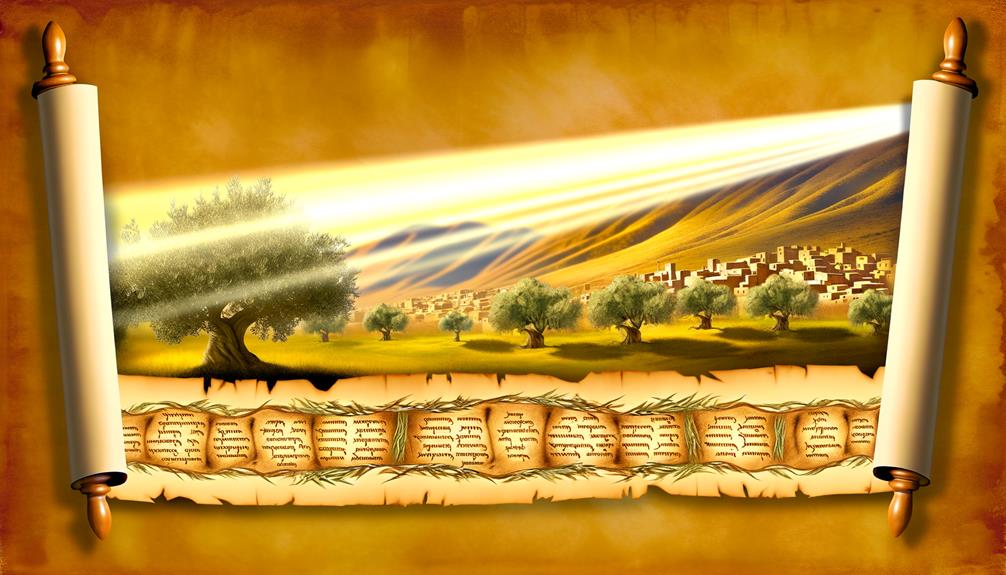Meaning of Dwayne in the Bible: Name Meaning
The name Dwayne, while not explicitly mentioned in the Bible, originates from the Gaelic name Dubhán, meaning ‘little dark one.’ This name draws from ancient Irish traditions and the 5th-century St. Dubhán, known for his missionary work.
The etymology of Dwayne involves themes of darkness and light, aligning with biblical motifs where darkness often symbolizes spiritual ignorance and light represents divine guidance. The cultural resonance of Dwayne underscores strength and resilience, akin to biblical figures such as Job and David.
Consequently, the name encapsulates profound historical and spiritual layers that invite further exploration.

Biblical Meaning of the Name Dwayne: Dark Stream and Spiritual Depth
| Aspect | Details |
|---|---|
| Name | Dwayne |
| Biblical Origin | Not directly mentioned in the Bible |
| Root Meaning | Irish origin meaning “dark” or “little dark one” |
| Spiritual Symbolism | Depth, mystery, hidden strength, divine flow |
| Possible Interpretation | One who moves with deep spiritual insight or carries unseen strength |
| Modern Biblical Insight | Symbolizes how God often works through what is hidden or unseen |
Origins of the Name Dwayne

The name Dwayne, which has its roots in the Gaelic name Dubhán, can be traced back to ancient Irish traditions and carries a rich historical and cultural significance.
In its original context, Dubhán was often associated with saints and early Christian figures who played pivotal roles in the spread of Christianity in Ireland. The name symbolizes a legacy of piety and dedication, prevalent in ecclesiastical records from the early medieval period.
Remarkably, the name Dubhán was borne by St. Dubhán, a revered 5th-century Irish saint known for his missionary work. This historical backdrop provides a profound layer of meaning, intertwining the name Dwayne with themes of spiritual fortitude and religious heritage, thereby enriching its theological resonance.
Gaelic Roots and Meanings

Building on the historical significance of the name Dubhán, exploring its Gaelic roots reveals a deeper understanding of its linguistic and cultural meanings.
The name Dubhán, from which Dwayne is derived, originates from the Gaelic term ‘dubh,’ meaning ‘black’ or ‘dark.’ It often connoted someone with dark features or a somber demeanor.
In historical contexts, the name was frequently used among early Irish saints, symbolizing piety and humility. The diminutive suffix ‘-án’ adds an affectionate or respectful nuance.
This etymology highlights the name’s deep cultural resonance, intertwining physical attributes with spiritual virtues.
While not directly biblical, its Gaelic roots enrich our comprehension of Dwayne’s profound cultural and possibly even theological dimensions.
Cultural Significance of Dwayne

The name Dwayne, rooted in Gaelic tradition, carries significant cultural weight both historically and in contemporary contexts.
Historically, its associations with noble lineage and strength have imbued it with an enduring presence, while modern interpretations often link it to notions of resilience and leadership.
Understanding the theological implications of such a name within the biblical framework invites a nuanced discussion on how cultural heritage and modern identity intersect.
Name’s Historical Origins
Tracing the historical origins of the name Dwayne, we find its roots embedded in Irish culture, derived from the Gaelic ‘Dubhán,’ meaning ‘little dark one.’ This etymology indicates a cultural significance that transcends mere nomenclature, hinting at the value placed on physical characteristics and perhaps even societal roles.
Understanding ‘Dubhán’ requires an appreciation of Gaelic naming conventions that often reflected familial and geographical influences.
| Aspect | Gaelic Origin | Cultural Significance |
|---|---|---|
| Name | Dubhán | Little dark one |
| Language | Gaelic | Irish |
| Historical Period | Medieval | Early Irish History |
| Etymology | Dubh (black) | Physical Characteristics |
| Societal Role | Descriptive | Familial/Geographical |
This table elucidates the name’s linguistic and cultural layers, offering a glimpse into its historical context.
Modern Interpretations
In contemporary culture, the name Dwayne has evolved beyond its Gaelic origins to embody diverse meanings and associations, often influenced by prominent figures and modern societal trends.
One such figure is Dwayne ‘The Rock’ Johnson, whose global fame has imbued the name with attributes of strength, resilience, and charisma. This modern reinterpretation contrasts sharply with the name’s historical Gaelic meaning of ‘swarthy’ or ‘dark.’
Additionally, the name’s integration into popular culture has led to its frequent appearance in media and entertainment, further solidifying its contemporary significance.
While not directly associated with Biblical narratives, Dwayne’s modern cultural resonance underscores the dynamic nature of names and their evolving significance across different eras and contexts.
Biblical Name Comparisons

Among the many names found in the Bible, each carries unique historical significance and theological implications that merit careful comparison and analysis. Names like Abraham, Moses, and David are not merely identifiers but embody distinct roles within the divine narrative.
Abraham, meaning ‘father of many,’ symbolizes the foundation of faith and covenant.
Moses, translating to ‘drawn out,’ represents deliverance and lawgiving.
David, denoting ‘beloved,’ signifies kingship and messianic promise.
By comparing these names, one can discern the multifaceted ways in which God interacts with humanity.
While the name Dwayne does not appear in biblical texts, understanding these foundational names provides a richer context for exploring its spiritual and cultural resonance within modern Christian discourse.
Symbolism of Darkness and Light

In biblical literature, light is frequently associated with divine guidance, illuminating the path of righteousness and revealing God’s truth to humanity, as seen in passages such as Psalm 119:105, ‘Your word is a lamp to my feet and a light to my path.’
Conversely, darkness is often emblematic of spiritual ignorance and the absence of God’s presence, exemplified in John 1:5, which states, ‘The light shines in the darkness, and the darkness has not overcome it.’
Understanding these symbolic representations allows for a deeper comprehension of the spiritual dichotomy that shapes biblical narratives and theological interpretations.
Light Represents Divine Guidance
Throughout biblical scripture, light frequently symbolizes divine guidance, illuminating the path of righteousness and contrasting starkly with the perils and moral ambiguity represented by darkness.
Historically, light has been synonymous with God’s presence; the Psalms declare, ‘Your word is a lamp for my feet, a light on my path’ (Psalm 119:105).
Theologically, light signifies God’s wisdom and truth, guiding believers through life’s complexities.
In the New Covenant, Jesus proclaims, ‘I am the light of the world‘ (John 8:12), underscoring His role as the ultimate source of spiritual illumination.
This symbolism underscores the divine provision of clarity, direction, and moral integrity, pivotal for a life aligned with God’s will.
Darkness Signifies Spiritual Ignorance
Darkness in biblical literature often symbolizes spiritual ignorance, representing a state of separation from God’s wisdom and divine truth.
Historically, this metaphor has roots in ancient Near Eastern thought, where light and darkness were potent symbols of knowledge and ignorance, respectively.
Theologically, darkness is frequently associated with the absence of divine presence, as seen in passages like John 1:5, where ‘the light shines in the darkness, and the darkness has not overcome it.’
This dichotomy underscores the profound need for divine illumination to dispel ignorance and guide humanity towards spiritual enlightenment.
Such symbolism emphasizes the transformative power of divine wisdom, leading believers out of spiritual darkness and into the light of understanding and communion with God.
Strength and Resilience Themes

The themes of strength and resilience in the name Dwayne can be traced back to the foundational narratives of biblical figures who exemplified these virtues through their unwavering faith and perseverance amidst adversity.
Biblical characters such as Job, David, and Moses are prime examples, consistently demonstrating fortitude and spiritual resilience. Their stories underscore the importance of inner strength and steadfastness in the face of trials, mirroring the inherent qualities implied in the name Dwayne.
The following table provides a brief comparison of these figures and their exemplified virtues:
| Biblical Figure | Key Virtue |
|---|---|
| Job | Endurance |
| David | Courage |
| Moses | Leadership |
These figures embody the scriptural ethos of strength and resilience, making the name Dwayne deeply meaningful.
Linguistic Connections to Faith

Exploring the linguistic roots of the name Dwayne reveals a profound connection to themes of faith and spiritual significance, seamlessly linking its etymology with the virtues exemplified by biblical figures like Job, David, and Moses.
Dwayne, derived from the Gaelic “Dubhán,” meaning “little dark one,” may not directly reference biblical names but mirrors the spiritual journeys of these figures.
Job’s unyielding faith amidst suffering, David’s unwavering trust in God despite adversities, and Moses’ steadfast leadership resonate with the resilience implied by Dwayne.
These connections underscore the name’s broader theological implications, suggesting that individuals bearing the name Dwayne are often seen as embodying perseverance, faith, and moral fortitude, hallmarks of biblical tradition and spiritual strength.
Historical Contexts of Names

Throughout history, names have served as essential identifiers, deeply intertwined with cultural, religious, and societal narratives that convey profound theological and historical significance.
In biblical contexts, names often encapsulated divine purposes, familial lineage, and prophetic destinies. For instance, the name ‘Abraham,’ meaning ‘father of many,’ reflected God’s covenant with him. Similarly, ‘Moses,’ derived from the Hebrew word for ‘drawn out,’ signified his rescue from the Nile and his role in leading Israel out of Egypt.
Understanding the historical contexts of names allows us to appreciate how they functioned as more than mere labels; they were vessels of identity and destiny.
While ‘Dwayne’ is not of biblical origin, exploring its historical roots broadens our comprehension of naming traditions.
Spiritual Interpretations

In examining spiritual interpretations, one must consider how names, including those not found in biblical texts like ‘Dwayne,’ can still embody significant personal and communal meanings within various religious frameworks.
Historically, names often carry profound meanings shaped by cultural and spiritual contexts. While ‘Dwayne’ may lack direct biblical reference, it can still resonate spiritually through:
- Symbolism: Names often symbolize attributes or values esteemed in religious teachings.
- Cultural Heritage: The name’s Gaelic roots may connect individuals to their ancestral faith traditions, fostering a sense of spiritual identity.
- Personal Revelation: Believers might find personal significance in their name through prayer and reflection, interpreting their name as part of their divine purpose.
Thus, even modern names can hold deep spiritual significance.
Conclusion
In traversing the rich tapestry of the name Dwayne, one witnesses a confluence of Gaelic etymology, cultural resonance, and profound biblical parallels.
Like a beacon piercing through the darkness, Dwayne embodies themes of strength and resilience, akin to the enduring light of faith.
The historical and spiritual layers interwoven in the name serve as proof to the timeless human quest for meaning, illuminating paths of understanding across generations.






